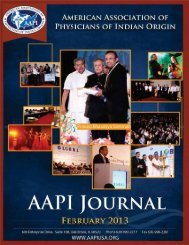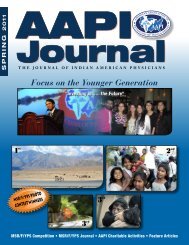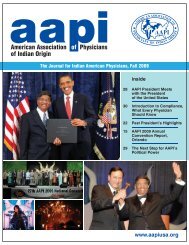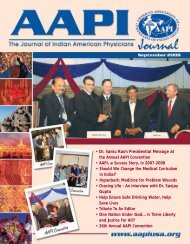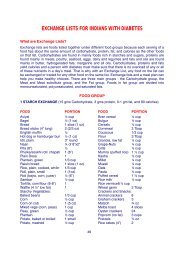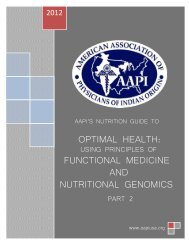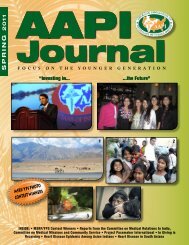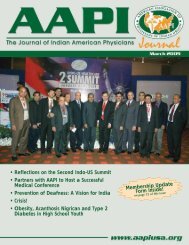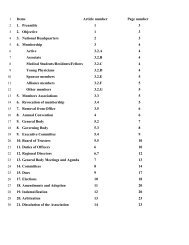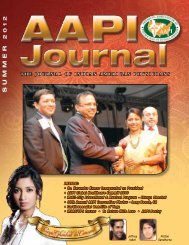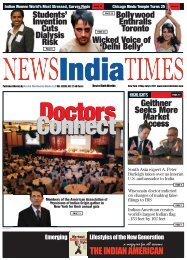functional medicine and nutritional genomics - American Association ...
functional medicine and nutritional genomics - American Association ...
functional medicine and nutritional genomics - American Association ...
Create successful ePaper yourself
Turn your PDF publications into a flip-book with our unique Google optimized e-Paper software.
AAPI’S NUTRITION GUIDE TO OPTIMAL HEALTH: USING PRINCIPLES OF FUNCTIONAL MEDICINE AND NUTRITIONAL GENOMICS<br />
adaptive immune system respectively, balance of<br />
Th1/Th2 cytokines produced by the mucosa-associated<br />
lymphoreticular system (MALT) <strong>and</strong> the GALT plays a<br />
role in the stabilization of mucosal surfaces in the gut<br />
(34). These mucosal surfaces have multiple tasks<br />
that include absorption, macromolecule transfer <strong>and</strong><br />
intestinal barrier <strong>and</strong> secretory functions. Large mucosal<br />
surfaces, such as the 300 square meters found in the<br />
human intestinal tract, are continuously exposed to<br />
millions of potentially harmful antigens from the<br />
environment, food <strong>and</strong> intestinal microbes. The mucosal<br />
surfaces possess a unique immune system that tightly<br />
controls the balance between responsiveness <strong>and</strong> nonresponsiveness.<br />
Loss of this immunological recognition<br />
of ‚friend vs foe‛ in the gut can result in activation of<br />
the inflammatory process (29). There is growing<br />
evidence that chronic inflammatory disorders in the<br />
mucosa, such as IBD, are due to the dysregulation of<br />
the mucosal immune system leading to a Th1<br />
dominant inflammatory reaction <strong>and</strong> impairment of the<br />
barrier function of the gut. (34)<br />
Table 2. Susceptibility genes associated with IBD<br />
Name Of The Gene Gene Abbreviation Gene Variants<br />
(discussed in this<br />
Caspase-activated<br />
recruitment domain<br />
15/nucleotide<br />
oligomerization domain<br />
2<br />
Autophagy-related 16like<br />
1<br />
Human beta defensins<br />
B2, B3 <strong>and</strong> B4<br />
Major histocompatibility<br />
complex<br />
review)<br />
CARD15/NOD2 � Arg702Trp<br />
� Gly908Arg<br />
� 1007finsC or<br />
c.3020insC<br />
89<br />
2012<br />
Genes/Gene Variants Associated With IBD – What Do<br />
We Know?<br />
Knowing the genes <strong>and</strong> gene variants associated with<br />
IBD can be useful for the practitioner once it is<br />
understood what genes are involved <strong>and</strong> how their<br />
variations are related to underlying mechanisms of IBD<br />
pathogenesis. Furthermore, evidence based nutrition<br />
intervention can be used to modulate genetic<br />
expression which can ultimately affect phenotypic<br />
outcome of the individual.<br />
While IBD appears to be of polygenic etiology,<br />
research strongly supports the assumption that<br />
susceptibility to IBD, especially Crohn’s disease, is<br />
inherited. It also indicates that IBD is not inherited as<br />
a Mendelian trait, but rather has a complex genetic<br />
basis with many contributing genes <strong>and</strong> at least nine<br />
susceptibility loci identified (34, 35). (See Fig 1).<br />
Table 2 is a classification of the susceptibility genes,<br />
their variants <strong>and</strong> areas genes affect (12,13,35,37-<br />
42).<br />
Areas Genes Affect<br />
Affects bacterial<br />
recognition of the<br />
intestinal wall<br />
ATG16L1 Affects bacterial<br />
recognition of the<br />
HBD-2, HBD-3 <strong>and</strong><br />
HBD-4<br />
intestinal wall<br />
Affects bacterial<br />
recognition of the<br />
intestinal wall<br />
MHC Affects immune<br />
response<br />
Interleukin-23 receptor IL23R Affects immune<br />
response<br />
Toll-like receptors TLRs Affects immune<br />
response<br />
Sodium dependent SLC22A4/SLC22A5 � SLC22A4 Affects mucosal



